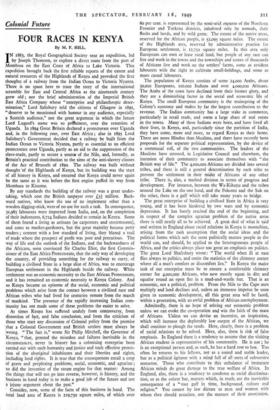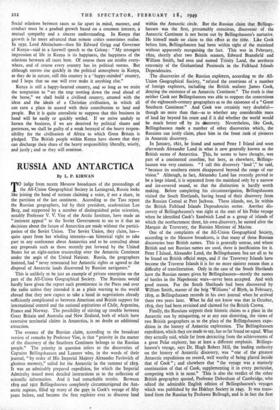Colonial Future
FOUR RACES IN KENYA
By M. F. HILL.
IN 1883, the Royal Geographical Society sent an expedition, led by Joseph Thomson, to explore a direct route from the port of Mombasa on the East Coast of Africa to Lake Victoria. This expedition brought back the first reliable reports of the extent and natural resources of the Highlands of Kenya and provoked the first thoughts of a railway from the Indian Ocean to Victoria Nyanza. There is no space here to trace the story of the international scramble for East and Central Africa as the nineteenth century grew old ; nor the brief administration of the Imperial British East Africa Company whose "enterprise and philanthropic deter- mination," Lord Salisbury told the citizens of Glasgow in 1891, "deserve to be mentioned with honour in any audience, especially a Scottish audience," nor the- great argument in which the future Lord Lugard's name was so palininent, over the retention of Uganda. In 1894 Great Britain declared a protectorate over Uganda and, in the following year, over East Africa ; also in 1895 Lord Salisbury's Government decided that a railway be built from the Indian Ocean to Victoria Nyanza, partly as essential to an efficient protectorate over Uganda, partly as an aid to the suppression of the slave-trade, partly to secure a source of the Nile, and, formally, as Britain's practical contribution to the aims of the anti-slavery clauses of the Act of Brussels of 1890. The railway was built without thought of the Highlands of Kenya, but its building was the start of all history in Kenya, and ensured that Kenya could never again be the same as it was before the first engine puffed its way from Mombasa to Kisumu.
By any standards the building of the railway was a great under- taking, which cost the British taxpayer over £51- million. Back- ward natives, who knew the use of no implement other than a wooden digging-stick, were of no use for such a task. In consequence, 31,985 labourers were imported from India, and, on the completion of their indentures, 6,724 Indians decided to remain in Kenya. Some of them found a living as artisans (as carpenters and stonemasons), and some as market-gardeners, but the great majority became petty traders ; content with a low standard of living, they blazed a 'trail of trade where the prospect of profit was poor and precarious. The way of life and the outlook of the Indians, and the backwardness of the Africans, soon convinced Sir Charles Eliot, the first Commis- sioner of the East Africa Protectorate, that the only way of developing the country, of providing something for the railway to carry, of building a civilised State in a large slice of Africa, was to encourage European settlement in the Highlands beside the railway. White settlement was an economic necessity to the East African Protectorate, and it has remained an economic necessity to Kenya Colony. And so Kenya became an epitome of the social, economic and political problems which arise from the contact between a civilised race and African tribes who had lived for centuries remote from the march of mankind. The presence of the rapidly increasing Indian com- munity has not made some of these problems the easier to solve.
At times Kenya has suffered unduly from controversy, from distortion of fact, and false conclusion, and from the criticism of those who start any discussion of Colonial policy from the premise that a Colonial Government and British settlers must always be ',wrong. "The fact is," wrote Sir Philip Mitchell, the Governor of Kenya, "that, granted the mistakes and failures inevitable in the circumstances, never in history has a colonising enterprise been carried out with such humanity and justice and such effective protec- tion of the aboriginal inhabitants and their liberties and rights, including land rights. It is true that the consequences entail a crop of grave and perplexing problems, social, economic, and agrarian ; so did the invention of the steam engine for that, matter: Among the things that will not go into reverse, however, is history, and the business in hand today is to make a good job of the future and not a jejune argument about the past."
Consider, now, some of the facts of this business in hand.. The total- land area of Kenya is 219,730 square miles, of which over
6o per cent. is represented by the semi-arid expanse of the Northern Frontier and Turkana districts, inhabited only by nomads, their flocks and herds, and by wild game. The extent of the native areas, reserved for the African people, is 52,095 square miles. The extent of the Highlands area, reserved by administrative practice for European settlement, is 12,750 square miles. In this area only Europeans can own or lease rural land, but people of any race can live and work in the towns and the townships and scores of thousands of Africans live and work on the settlers' farms, some as resident labourers with the right to cultivate small-holdings, and some as more casual labourers.
The population of Kenya consists of some 24,000 Arabs, about 30,00o Europeans, roo,000 Indians and over 4,000,000 Africans. The Arabs of the coast have declined from their former glory, and they are a diminishing factor in the social and economic life of Kenya. The small European community is the mainspring of the Colony's economy and makes by far the largest contribution to the revenue. The Indian community has a large stake in commerce, particularly in retail trade, and owns a large share of real estate in the towns. Many of these Indians were born, and have lived all their lives, in Kenya, and, particularly since the partition of India, they have come, more and more, to regard Kenya as their home. There are more Hindus than Muslims, and there have recently been proposals for the separate political representation, by the device of a communal roll, of the two communities. The leaders of the Muslims have stressed, in Legislative Council and elsewhere, the intention of their community to associate themselves with " the British way of life." The 4,000,000 Africans are divided into several tribes, and there is still a general determination by each tribe to prevent the settlement in their midst of Africans of any other tribe. There is, also, a marked division in terms of progress and development. For instance, between the Wa-Kikuyu and the tribes around the Lake on the one hand, and the Pokomo and the Suk on the other, there is a gulf which will take many years to bridge.
The great enterprise of building a civilised State in Africa is very young, and it has been hindered by two wars and by economic depression. It has barely reached the end of the beginning, and in respect of the complex agrarian problem of the native areas there is still nearly all to be achieved. A great deal of what is said and written in England about racial relations in Kenya is moonshine, arising from the rash assumption that the social ideas and the political forms which suit the most politically mature people in the world can, and should, be applied to the heterogeneous people of Africa, and the critics always place too great an emphasis on politics. The great Lord' Shaftsbury wrote: "The world when ill at ease flies always to politics, and omits the statistics of the chimney corner where all a man's comfort or discomfort lies." In Kenya the major task of our enterprise must be to ensure a comfortable chimney corner for 4,000,000 Africans, who now mostly squat in dirt and squalor round an open fire in a mud-and-wattle hut. That is an economic, not a political, problem. From the Nile to the Cape men multiply and land declines and, unless an immense impetus be soon given to economic development, all this great area will be faced, within a generation, with an awful problem of African unemployment.
Admittedly, there is no hope of solving our economic problem unless we can evoke the co-operation and win the faith of the mass of Africans. Unless we can devise an incentive, an inspiration, which will increase the deplorably low output of the African, we shall continue to plough the sands. Here, clearly, there is a problem of racial relations to be solved. Here, also, there is risk of false emphasis. In England there is a tendency to assume that the visiting African student is representative of his community. He is not ; he is an exceptional person and, as such, he has a hard row to hoe. Too often he returns to his fellows, not as a sound and stable leader, but as a political agitator with a mind full of all sorts of subversive nonsense. Those who contribute to this unbalance of immature African minds do great damage to the true welfare of Africa. In England, also, there is a tendency to condemn as racial discrimina- tion, or as the colour bar, matters which, in truth, are the inevitable consequence of a "vast gulf in time, background, culture and religion." You cannot by law dictate ' to men and women with whom they should associate, nor the manner of their association. Social relations between races so far apart in mind, manner, and conduct must be a gradual growth based on a common interest, a mutual sympathy and a sincere understanding. In Kenya that growth, is far more advanced than remote critics sometimes realise. In 193o, Lord Altrincham—then Sir Edward Grigg and Governor of Kenya—said in a farewell speech to the Colony : " My strongest impression of life in Kenya is its happiness, the happiness of the relations between all races here. Of course there are misfits every- where, and of course every country has its political storms. But although storms rise quickly in the political atmosphere in Kenya, as they do in nature, still this country is a ' happy-minded ' country, and I hope that no one will ever make it anything else."
Kenya is still a happy-hearted country, and so long as we resist the temptation to " set the trap trotting down the road ahead of the horse," we shall build a civilised country, attuned with the ideas and the ideals of a Christian _civilisation, in which all can earn a place in accord with their contribution to land and people. But it is quite unrealistic to suppose that this business in hand will be easily or quickly settled. If we strive unduly to hasten the business, if we are deceived by political shams and pretences, we shall be guilty of a weak betrayal of the heavy respon- sibility for the civilisation of Africa to which Great Britain is pledged. The British people within Kenya have shown that they can discharge their share of the heavy responsibility liberally, wisely, and justly ; and so they will continue.







































 Previous page
Previous page